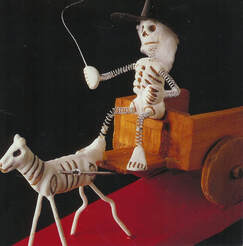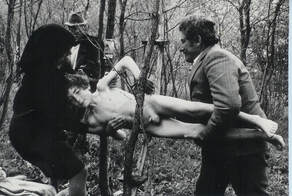from the Belgian anthropologist who, over a century ago, coined the term
Rites of Passage

"For groups, as well as for individuals, life itself means to separate and to be reunited, to change form and condition, to die and to be reborn. It is to act and to cease, to wait and rest, and then to begin acting again, but in a different way. And there are always new thresholds to cross: the thresholds of summer and winter, of a season or a year, of a month or a night; the thresholds of birth, adolescence, maturity, and old age; the threshold of death and that of the afterlife—for those who believe in it."
Arnold van Gennep, Les Rites de Passage (1908)
and from a great master of transition and change
"I don't know if I've ever been happy if we're talking straight. I don't know . . . I mean . . . happy? I don't consider myself happy and I don't consider myself unhappy, I've just never thought of life in terms of happiness and unhappiness. It just never occurred to me . . . I do think though, that you never stop anywhere, there's no place to stop in . . . Whenever you get to a plateau, that's not it, you got to go on to the next one. You can't stay nowhere, there's no place to stay, there's no place that will keep you."
Bob Dylan, Westwood One Interview (1984)
"He not busy being born is busy dying."
Bob Dylan, It's Alright, Ma (I'm only Bleeding)
Arnold van Gennep, Les Rites de Passage (1908)
and from a great master of transition and change
"I don't know if I've ever been happy if we're talking straight. I don't know . . . I mean . . . happy? I don't consider myself happy and I don't consider myself unhappy, I've just never thought of life in terms of happiness and unhappiness. It just never occurred to me . . . I do think though, that you never stop anywhere, there's no place to stop in . . . Whenever you get to a plateau, that's not it, you got to go on to the next one. You can't stay nowhere, there's no place to stay, there's no place that will keep you."
Bob Dylan, Westwood One Interview (1984)
"He not busy being born is busy dying."
Bob Dylan, It's Alright, Ma (I'm only Bleeding)
The Three Phases of a Rite of Passage
According to van Gennep, a rite of passage comes in three phases:
Séparation (Separation) Marge (Transition) Agrégation (Incorporation)
Or put another way:
the Dying the In-Between the Rebirth
This calls to mind the stages of physical dying made famous Elisabeth Kübler-Ross back in 1969. The Kübler-Ross stages of physical dying are also applicable to a symbolic dying and rebirth.
Denial Anger Bargaining Depression Acceptance
Any significant life passage – the dying, the in-between, and the rebirth – requires that a person first leave Denial behind and step consciously into the transition. To move toward Acceptance, a person then must journey through the great time in between. This liminal space is full of deep human emotion: both the Anger and Sorrow/Depression of great mourning that Kübler-Ross emphasized, as well as the Fear and Excitement for the rebirth that’s to come. Bargaining can be thought of as "the re-storying" – the restoring of purpose and meaning – that a person does in preparation for rebirth into a new life phase.
Here are just a few examples of important rites of passage in a person's life:
An adolescent stepping into adulthood. Getting married. Getting divorced.
Entering or leaving the armed forces. Birth of a child. Starting or ending an important job.
Stepping into caring for someone seriously frail or ill. Retiring from a long career.
After the symbolic death and before the rebirth, how do you navigate this tumultuous time in-between? The old story, the old relationship, the old way of living has died or is dying. But the new story, the new relationship, the new way of living has yet to be revealed.
Click on any picture below to learn more.
Séparation (Separation) Marge (Transition) Agrégation (Incorporation)
Or put another way:
the Dying the In-Between the Rebirth
This calls to mind the stages of physical dying made famous Elisabeth Kübler-Ross back in 1969. The Kübler-Ross stages of physical dying are also applicable to a symbolic dying and rebirth.
Denial Anger Bargaining Depression Acceptance
Any significant life passage – the dying, the in-between, and the rebirth – requires that a person first leave Denial behind and step consciously into the transition. To move toward Acceptance, a person then must journey through the great time in between. This liminal space is full of deep human emotion: both the Anger and Sorrow/Depression of great mourning that Kübler-Ross emphasized, as well as the Fear and Excitement for the rebirth that’s to come. Bargaining can be thought of as "the re-storying" – the restoring of purpose and meaning – that a person does in preparation for rebirth into a new life phase.
Here are just a few examples of important rites of passage in a person's life:
An adolescent stepping into adulthood. Getting married. Getting divorced.
Entering or leaving the armed forces. Birth of a child. Starting or ending an important job.
Stepping into caring for someone seriously frail or ill. Retiring from a long career.
After the symbolic death and before the rebirth, how do you navigate this tumultuous time in-between? The old story, the old relationship, the old way of living has died or is dying. But the new story, the new relationship, the new way of living has yet to be revealed.
Click on any picture below to learn more.
Youth, Midlife & Elder Passages
Proudly powered by Weebly




